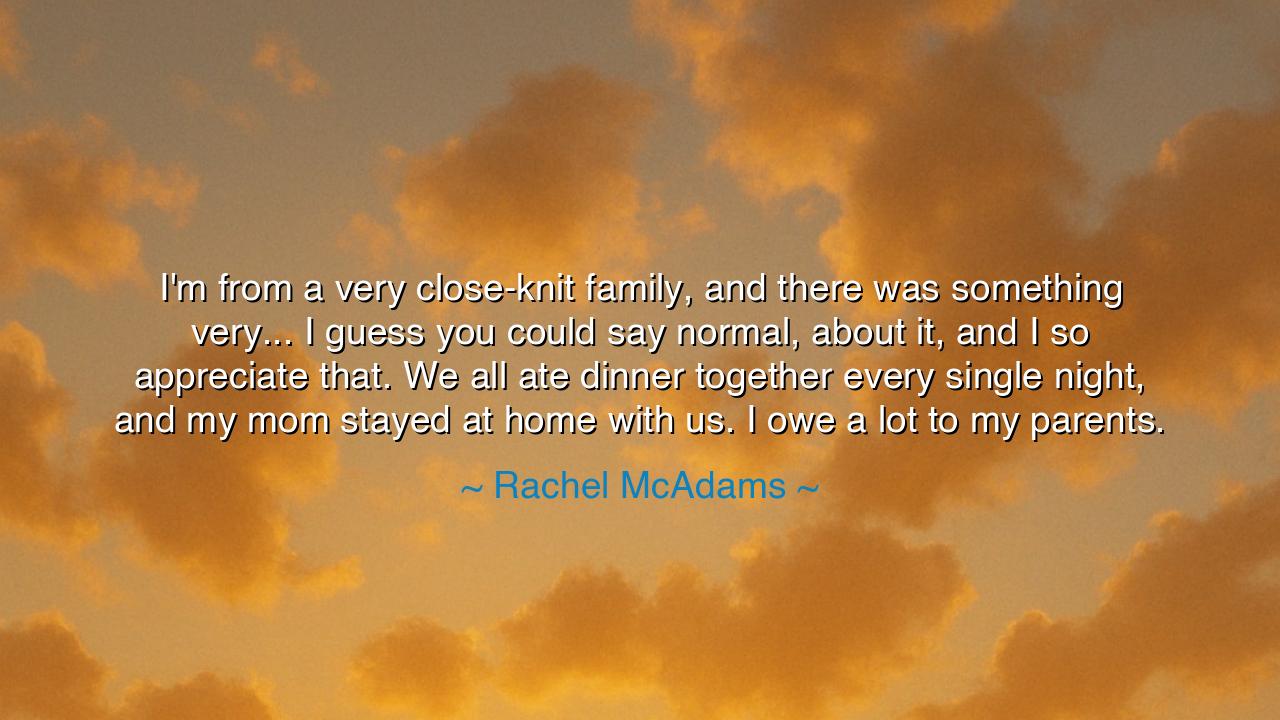
I'm from a very close-knit family, and there was something
I'm from a very close-knit family, and there was something very... I guess you could say normal, about it, and I so appreciate that. We all ate dinner together every single night, and my mom stayed at home with us. I owe a lot to my parents.






Hearken, O children of the ages yet unborn, and attend the words of Rachel McAdams, who reflected upon the sacred hearth of her youth: “I’m from a very close-knit family, and there was something very… I guess you could say normal, about it, and I so appreciate that. We all ate dinner together every single night, and my mom stayed at home with us. I owe a lot to my parents.” In these words lies a meditation upon the quiet power of family, the shaping hand of love, and the enduring influence of shared rituals upon the hearts of the young.
Consider the meaning: McAdams celebrates not wealth, not fame, but the simple, profound togetherness of family life. The act of sharing a meal each evening is more than nourishment; it is a communion of hearts, a sacred moment where dialogue, understanding, and empathy are fostered. Her mother’s presence, constant and nurturing, became a pillar upon which her life was built, illustrating the ancient truth that the care of the young forms the foundation of character and destiny.
History offers reflections of this truth. Recall the family of Abraham Lincoln, whose early life was marked by the steadfast guidance of his mother, Nancy Hanks Lincoln, and the support of his father, Thomas. Though humble and facing hardship, the regularity of nurture, the lessons imparted at home, and the enduring love of his parents shaped a mind capable of wisdom, empathy, and leadership. In this, we see that the smallest daily acts—shared meals, guidance, the presence of attentive care—can echo across the years in profound ways.
McAdams’ words also speak to the value of normalcy and stability. In a world that often prizes spectacle and exception, the ordinary moments—dinners, conversation, the quiet presence of a parent—provide a sanctuary where the soul is nurtured and strengthened. There is heroism in constancy, in reliability, in the everyday acts that form the bedrock of life. The close-knit family becomes a training ground for virtue, resilience, and gratitude.
Yet there is also a lesson in appreciation and acknowledgment. McAdams openly states that she owes a lot to her parents, recognizing the debt of care and guidance that shapes every succeeding choice. The ancients would remind us that to honor one’s parents is to honor the lineage of love and wisdom, to acknowledge that our achievements are not ours alone, but built upon the sacrifices, vigilance, and devotion of those who came before.
Consider, too, that such family rituals create a sense of belonging and identity. The communal meals, the shared laughter, the simple presence of her mother at home, all knit together a sense of self rooted in love and security. In the tumult of life, this foundation provides clarity, purpose, and resilience, echoing the ancient understanding that a soul nurtured in care becomes a soul capable of generosity, empathy, and courage.
From this, let us draw guidance: cultivate moments of presence with those you love. Share meals, listen intently, and honor the constancy of care. Recognize and appreciate those who support and guide you, for their influence shapes not only your days but your very character. The ordinary rituals of family life, though subtle, are among the most powerful instruments of enduring wisdom.
Finally, carry forward McAdams’ insight into your own life: treasure the ordinary, honor the hands that nurture you, and build your own spaces of love and stability. In doing so, you create a legacy not of fleeting glory, but of enduring connection, gratitude, and resilience—a testament to the power of a close-knit family to shape generations yet to come.






AAdministratorAdministrator
Welcome, honored guests. Please leave a comment, we will respond soon